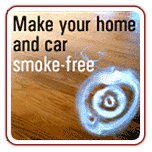 November 17, 2008 - Exposure to environmental tobacco (ETS, secondhand, sidestream, involuntary, passive) smoke is a major risk to human health and the home and car are the greatest single source of ETS for children.
November 17, 2008 - Exposure to environmental tobacco (ETS, secondhand, sidestream, involuntary, passive) smoke is a major risk to human health and the home and car are the greatest single source of ETS for children.
Kids exposed to smoke are at higher risk since they breath in more air by weight than adults. Both the respiratory rate and heart rate are higher in children below the age of 13 than adults. Children breathe in a greater amount of air per body weight compared to adults. The younger the child, the greater the potential for exposure.
The study by Branden E. Yee, M.D. and his group presented at the American Society of Anesthesiologists annual meeting that concludes Oct. 22, 2008, measured levels of carboxyhemoglobin, which is formed when carbon monoxide binds to the blood, in 200 children between the ages of 1 and 12. Carbon monoxide binds to blood 200 times more easily than oxygen, but the resultant carboxyhemoglobin is unable to deliver oxygen to body tissue, including that of the brain, heart and muscle. The study provides evidence that the carbon monoxide levels of children exposed to second-hand smoke are often similar to that of active adult smokers and frequently higher than levels in adults exposed to second-hand smoke. (Children May Be More Affected By Second-Hand Smoke Than AdultsNewswise Medical New, 10/22/2008.)
In another study it was found that paternal smoking inside the home leads to significant fetal and maternal exposure to ETS and may subsequently affect fetal health. In the indoor-smoker group, neonatal nicotine concentrations were higher than in the outdoor and nonsmoker groups. (Moon-Woo Seong et al., Neonatal Hair Nicotine Levels and Fetal Exposure to Paternal Smoking at Home, Am. J. Epidemiology 168(10): 1140-1144, 2008)
Banning smoking when children are in the home or car is a no-brainer - even Philip Morris agrees. David Sutton, a spokesman for Philip Morris USA said the company believes the public "should be guided by the conclusions of public health officials regarding the health effects of secondhand smoke" and "particular care should be exercised where children are concerned." Bill Phelps, a spokesman for the nation's largest cigarette maker, Philip Morris USA, said the company's website points out that public health officials have shown that secondhand smoke causes heart disease in nonsmokers. Phelps: "We agree that people should be able to avoid being around secondhand smoke, particularly in places where they must go."
Some related news brief: Maine - illegal to smoke in cars while children present.. and Vehicles Most Dangerous Space for Second-Hand Smoke Levels... For others - do a random search.
Bringing the World of Tobacco Control closer together..
Further evidence - STOP smoking in the presence of your children..
Subscribe to:
Post Comments (Atom)


To Provide Public Awareness
Purpose
About Us
Contact Us
2008 HIGHLIGHTS
TOPIX PAPERS - 2008 & 2009..
Archive
-
▼
2008 (578)
-
▼
11/16 - 11/23 (14)
- One can Camel SNUS addicted to nicotine for life..
- New Mexico appeals court revives smoking lawsuit..
- RJR's Camel SNUS twice nicotine content..
- ACS Great American Smokeout - 2008..
- Fitch 2009 U.S. Tobacco Outlook..
- South Carolina to spend NO money on tobacco preven...
- General Tobacco lays off nearly 25% of work force..
- Netherlands the smoking ban must be enforced - Ab ...
- Reynolds America moving ahead with dissolvable tob...
- PMI Webcast Tuesday, November 18, 2008..
- Pennsylvania Smoking Ban - Lots of Exceptions..
- Further evidence - STOP smoking in the presence of...
- Smoking a contributor to many dermatologic conditi...
- Tobacco smoking increases the risk of moderate to ...
-
▼
11/16 - 11/23 (14)
© Copyright Notice: The content of this website is for information education purposes only and any newsbrief may be used only as "fair use" for information/education purposes with permission of the authors and providing that original references and associated reference links are included in HTML format.
0 comments:
Post a Comment